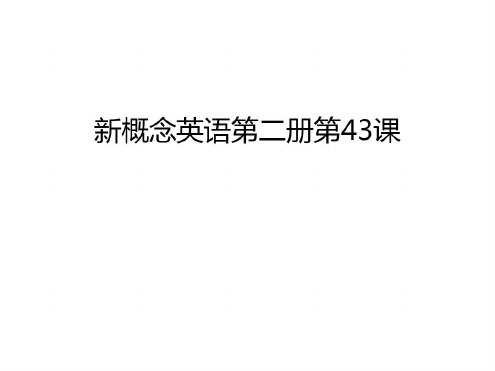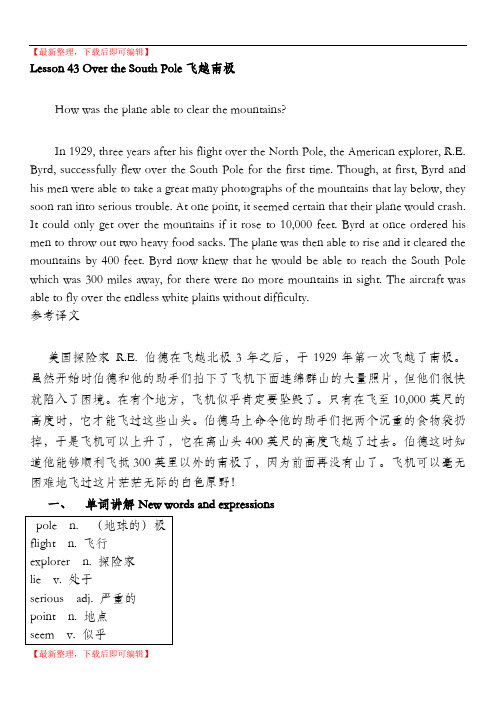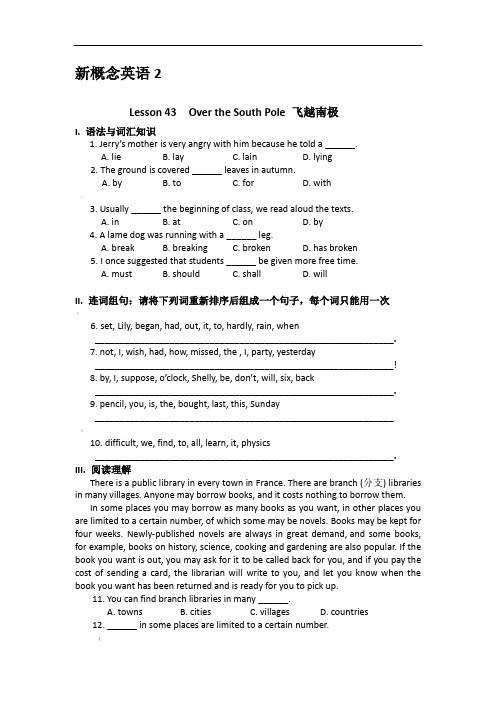新概念英语第二册课后练习题答案详解(第43课)
新概念英语第二册第43课:OvertheSouthPole

新概念英语第二册第43课:OvertheSouthPole新概念英语第二册第43课:Over the South PoleLesson 43 Over the South Pole飞越南极First listen and then answer the question.听录音,然后回答以下问题。
How was the plane able to clear the mountains?In 1929, three years after his flight over the North Pole, the American explorer, R.E. Byrd, successfully flew over the South Pole for the first time. Though, at first, Byrd and his men were able to take a great many photographs of the mountains that lay below, they soon ran into serious trouble. At one point, it seemed certain that their plane would crash. It could only get over the mountains if it rose to 10,000 feet. Byrd at once ordered his men to throw out two heavy food sacks. The plane was then able to rise and it cleared the mountains by 400 feet. Byrd now knew that he would be able to reach the South Pole which was 300 miles away, for there were no more mountains in sight. The aircraft was able to fly over the endless white plains without difficulty.参考译文美国探险家R.E. 伯德在飞越北极3年之后,于1929年第一次飞越了南极。
新概念二册第43课

lie [lai] 1) v. 说谎 lie-lied-lied-lying
She lies about her age. 关于年龄她说谎了。
You lied. = You lied to me. 你骗人! 你撒谎! You, liar! 你, 骗子! liar ['laiə(r)] n.(惯于)说谎者
lay the table 放桌子
lieLeabharlann 1.lie - lied - lied-lying 撒谎 2.lie - lay - lain-lying 躺着;平放,位于
lay
lay - laid - laid-laying 产卵,下 蛋;放,搁
巧记 lie 和 lay
• 撒谎 lie,lied,lied,don't be a liar; • 产蛋 lay,laid,laid,a hen laid an egg • 放置 A boy picked it up,and laid it in the bag.
• take photos 拍照
• a great many +(pl) 许多,大量 • • run into trouble/ get into trouble • 惹上麻烦
• At one point, it seemed certain that their plane would crash.
flight [flait] n. fly-flew-flown 1) 飞行,航班 This is his first flight over the North Pole. 这是他第一次飞越北极 All flights have been cancelled because of the fog. 因为雾的缘故, 所以航班都被取消了。
新概念英语第二册第43课知识讲解_2022年学习资料

4.It could only get over the mountains if it rose to 0,000 feet.-只有在飞至10,000英尺的高度时,它才能飞过这些山头。-5.Byrd at on e ordered his men to throw out two heavy food-sacks.德马上命令他的助手们把两个沉重的食物袋扔掉。-Throw out-扔出去。-Sack表示“袋子”。一般是指 较结实的,用来装面粉、煤、食物等的大袋-子。
★clear-V.越过-凌空、不接触地越过,跳过,没有接触面的飞跃-口飞跃山峰-clear the mou tain-那匹马越过了栅栏-The horse cleared the fence.-over-adv.越 (距离)-go over-★plain-n.平原-plain girl-平凡的女孩
句中知识点-1.In 1929,three years after his flight over the North Pole,the-American explorer,R.E.Byrd,successfull flew over the South-Pole for the first time.-美国探险家R. .伯德在飞越北极3年之后,于1929年第一次飞越了南-极。-这句话包含两个同位语。-three years after..为1929的同位语,作插入性的补充说明;R.E-.Byrd作the American exp orer的同位语。-短语:-首次;第一次
新概念英语第二册第43课
☐★pole n.-地球的极-South Pole-南极-North Pole-北极-Pole Star-北极星
单词-口pole:极点;磁极;电极;杆-☐positive pole-正极-negative pole-负 -a flagpole-旗杆
新概念第二册第43课.

1.The American explorer, R. E. Byrd, successfully flew over the North Pole first time. 2. Byrd and his were able to bake a lot of photographs of the mountains that lay below. 3.The plane could only get over the mountains if it rose to 10,000 miles. 4. After Byrd ordered his men to throw out two heavy food sacks, the plane was able to rise.
Lesson 43 Over the South Pole
Four oceans in the world
the Arctic Ocean
F
the Pacific Ocean the Atlantic Ocean
A
the Indian Ocean
New words and expressions
can “can" is one of the most commonly used modal verbs in
English. It can be used to express ability or opportunity, to request or offer permission, and to show possibility or impossibility. Examples: I can ride a horse. ability We can stay with my brother when we are in Paris. opportunity She cannot stay out after 10 PM. permission Can you hand me the stapler? request Any child can grow up to be president. possibility
新概念二 Lesson43 课后练习

新概念二Lesson 43 课后练习填空。
1.第一次2.拍……的照片3.陷入困境4.在某一时刻5.上升至6.白色原野7.在看得见的范围内”、“在可看见之处”课文填空。
In 1929, three years after his the North Pole,the American explorer, R.E. Byrd, successfully the South Pole for the first time. Though, at first, Byrd and his men take a great many photographs of the mountains that lay below, they soon serious trouble. At one point certain their plane . It the mountains if it rose to10,000 feet. Byrd at once ordered his men to throw out two heavy . The plane then rise and it the mountains by 400 feet.Byrd now knew that he reach the South Pole which was 300 miles10 away, for there were no more mountains .The aircraft fly over thewithout difficulty.根据句意和汉语提示完成句子。
1.At last they____________(成功地)solved the problem.2.Did you have a good___________(飞行)?3.Did you see Leo’s___________(相片) in the newspaper?4.Everest is the highest___________(山) in the world.5.Judging from the report, the damage was not___________(严重的).根据句意,用方框内所给单词或短语的适当形式填空。
裕兴新概念英语第二册笔记 第43课(完整资料).doc

【最新整理,下载后即可编辑】Lesson 43 Over the South Pole飞越南极How was the plane able to clear the mountains?In 1929, three years after his flight over the North Pole, the American explorer, R.E. Byrd, successfully flew over the South Pole for the first time. Though, at first, Byrd and his men were able to take a great many photographs of the mountains that lay below, they soon ran into serious trouble. At one point, it seemed certain that their plane would crash. It could only get over the mountains if it rose to 10,000 feet. Byrd at once ordered his men to throw out two heavy food sacks. The plane was then able to rise and it cleared the mountains by 400 feet. Byrd now knew that he would be able to reach the South Pole which was 300 miles away, for there were no more mountains in sight. The aircraft was able to fly over the endless white plains without difficulty.参考译文美国探险家R.E. 伯德在飞越北极3年之后,于1929年第一次飞越了南极。
新概念二Lesson 43基础能力测试-新概念英语第二册课后练习及答案

Lesson 43检测练习【基础过关】一、写出下列单词1.n.探险者_____________2. v. 似乎;好像________________3adj.严重的__________________ 4. n.飞行;航班______________________ 5.n.地点__________________ 6.adj.无尽的__________________7.v.坠毁__________________8.v.命令__________________9.v.举动;举止_________________10.v.使恼怒_________________11.v.成功____________________12.n.现在__________________13.v.越过____________________14.n.平原__________________15.v.说服___________________16.n.袋子__________________二、翻译下列短语1.可以拍照____________________2.位于下面的山________________3.陷入困境___________________4.在一个地方_____________5.扔出两大袋重的食物_________________6.眼前_________________7.茫茫无际的白色原野__________________8.现在;当下________________9.不管怎么说_________________10.对人粗暴__________________11.本质上_____________________12.举止古怪__________________13.着火_______________________14.成功做某事_________________三、翻译句子1.那个美国探险家,第一次成功飞越了南极。
新概念英语二习题Lesson-43-44

新概念英语2Lesson 43 Over the South Pole 飞越南极I. 语法与词汇知识1. Jerry’s mother is very angry with him because he told a ______.A. lieB. layC. lainD. lying2. The ground is covered ______ leaves in autumn.A. byB. toC. forD. with:3. Usually ______ the beginning of class, we read aloud the texts.A. inB. atC. onD. by4. A lame dog was running with a ______ leg.A. breakB. breakingC. brokenD. has broken5. I once suggested that students ______ be given more free time.A. mustB. shouldC. shallD. willII. 连词组句:请将下列词重新排序后组成一个句子,每个词只能用一次(6. set, Lily, began, had, out, it, to, hardly, rain, when____________________________________________________________.7. not, I, wish, had, how, missed, the , I, party, yesterday____________________________________________________________!8. by, I, suppose, o’clock, Shelly, be, don’t, will, six, back____________________________________________________________.9. pencil, you, is, the, bought, last, this, Sunday____________________________________________________________ !10. difficult, we, find, to, all, learn, it, physics____________________________________________________________.III. 阅读理解There is a public library in every town in France. There are branch (分支) libraries in many villages. Anyone may borrow books, and it costs nothing to borrow them.In some places you may borrow as many books as you want, in other places you are limited to a certain number, of which some may be novels. Books may be kept for four weeks. Newly-published novels are always in great demand, and some books, for example, books on history, science, cooking and gardening are also popular. If the book you want is out, you may ask for it to be called back for you, and if you pay the cost of sending a card, the librarian will write to you, and let you know when the book you want has been returned and is ready for you to pick up.11. You can find branch libraries in many ______.A. townsB. citiesC. villagesD. countries12. ______ in some places are limited to a certain number.|A. NovelsB. HistoryC. ScienceD. Cooking13. How long you can keep the booksA. Four days.B. Four weeks.C. Four months.D. Four years.IV. 翻译14. the North Pole ___________________________15. fly over ___________________________16. at one point ___________________________~17. get over ___________________________18. endless white plain ___________________________19. 他毫无困难地通过了考试。
- 1、下载文档前请自行甄别文档内容的完整性,平台不提供额外的编辑、内容补充、找答案等附加服务。
- 2、"仅部分预览"的文档,不可在线预览部分如存在完整性等问题,可反馈申请退款(可完整预览的文档不适用该条件!)。
- 3、如文档侵犯您的权益,请联系客服反馈,我们会尽快为您处理(人工客服工作时间:9:00-18:30)。
新概念英语第二册课后练习题答案详解(第43课)
新概念英语第二册课后习题 Lesson 43
1. b
根据课文第2-3行….R. E. Byrd, successfully flew over to the South Pole for the first time 能够判断出只有b. to fly over the South Pole 与事实相符,其他3个选择都不是R.E. Byrd 第一个做的事。
所以选b.
2. b
根据课文第7-8行Byrd at once ordered his men to throw out two heavy food sacks. The plane was then able to rise... 能够判断只有b. by making his plane lighter 与课文的实际情况相符。
其他3个选择都不是他成功的原因,所以应该选b.
3. a
这是一个一般过去时疑问几,需要选出准确的谓语动词。
a. lie (躺,处于某种状态,位于);
b. lay (置,放)是lie的
过去式;c. laid 是lay 的过去式和过去分词;d. lain 是 lie 的过去分词。
只有a. 最符合题目意思和语法。
因为在疑问句中已经有助动词Did,所以不能用过去式或过去分词,只能用动词原形。
b. 虽然也是动词原形,但不合乎题目意思,所以只能选a.
4. a
前一句It could only get over the mountains if it rose to 10,000 feet (只有在飞至10,000英尺的高度时,它才能飞过这些山头)表示对想像的条件所作出的推测,只有a. would succeed in getting(会成功)与前一句的含义比较吻合;b. got 是过去式,表示过去发生的情况;c. was able to 表示过去成功地完成; d. had got 表
示过去早已经完成的动作。
这3个选择都与前一句含义不符,所以应
该选a.
5. d
前一句中的was able to rise (得以上升)表示过去成功完成的
事情。
a. could rise , b. might rise, c. might succeed in
rising 都表示对没发生的事情的推测,与前一句含义不符。
只有d. rose 表示过去发生的事情,与前一句时态相符。
所以选d.
6. d
前一句中的be able to 表示“能够”,需要选出与它含义相同
的词。
a. impossible(不可能的)和b. necessary(必要的) 都与be able to 意思不同;c. able(有水平的)不能单独作表语,要用be able to. 因为这个句子的主语是it, 代表前一句中that 引导的整个从句,所以不适合于这个句子。
只有d. possible(可能的,能办到的)与
able to 的含义相同,所以选d.
7. a
这是一个定语从句,需要选出准确的关系代词作主语。
c. it 和d. which it 都不合乎语法,都不能作关系代词;b. who 是作主语的
关系代词,但其先行词必须是人,而本句的先行词是the Pole. 只用a. which 最符合语法,它是关系代词,能够作主语指物,所以选a.
8. c
只有c. had 最符合题目意思.
a. ran after(追赶),
b. followed(跟随), d. ran(跑)这3个
选择都不合乎题目意思,意思不通.
9. c
只有c. immediately(立刻,马上)同前一句中的at once 是同义词,所以选c.
a. once(一次),
b. soon(不久);d. quickly(快速地)这3个选择都与at once 的含义不太一样。
10. d
前一句The plane cleared the mountains 中的cleared 是"飞跃"的意思,需要选出同它含义相同的词. a. covered(覆盖), b. cleaned(弄干净), c. emptied(倒空)这3个选择都与cleared的意思不同. 只有d. flew over(飞过)与cleared 意义相同,所以选d.
11. a
本题目中,b. arrive(到达)是不及物动词,后面应该带介词at 才对。
c. reach at,
d. reach in 都不对,因为reach 当“到达”讲的时候是及物动词,后面不应带介词。
所以a. arrive at 是准确答案。
12. c
前一句的There were no more mountains in sight.(看不见高山)中的in sight 是“看得见”的意思,因为该句是否定句,所以是“不被看见”的意思,只有c. couldn't be seen(不能被看见)同前一句意思相符合。
a. were blind 是盲人
b. couldn't see 不能看见
d. were sightless 没视力的这3个选择都与前一句意思不符合。
